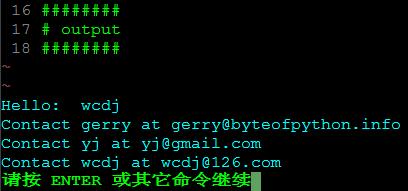标签:sum delphi ecif sdn function print file spec usr
当要使函数接收元组或字典形式的参数 的时候,有一种特殊的方法,它分别使用*和**前缀 。这种方法在函数需要获取可变数量的参数的时候特别有用。
[注意]
[1] 由于在args变量前有*前缀 ,所有多余的函数参数都会作为一个元组存储在args中 。如果使用的是**前缀 ,多余的参数则会被认为是一个字典的健/值对 。
[2] 对于def func(*args):,*args表示把传进来的位置参数存储在tuple(元组)args里面。例如,调用func(1, 2, 3) ,args就表示(1, 2, 3)这个元组 。
[3] 对于def func(**args):,**args表示把参数作为字典的健-值对存储在dict(字典)args里面。例如,调用func(a=‘I‘, b=‘am‘, c=‘wcdj‘) ,args就表示{‘a‘:‘I‘, ‘b‘:‘am‘, ‘c‘:‘wcdj‘}这个字典 。
[4] 注意普通参数与*和**参数公用的情况,一般将*和**参数放在参数列表最后。
[元组的情形]
[字典的情形]
在gvim中的输出结果:
http://blog.csdn.net/delphiwcdj/article/details/5746560
标签:sum delphi ecif sdn function print file spec usr
原文地址:http://www.cnblogs.com/bincoding/p/7944860.html